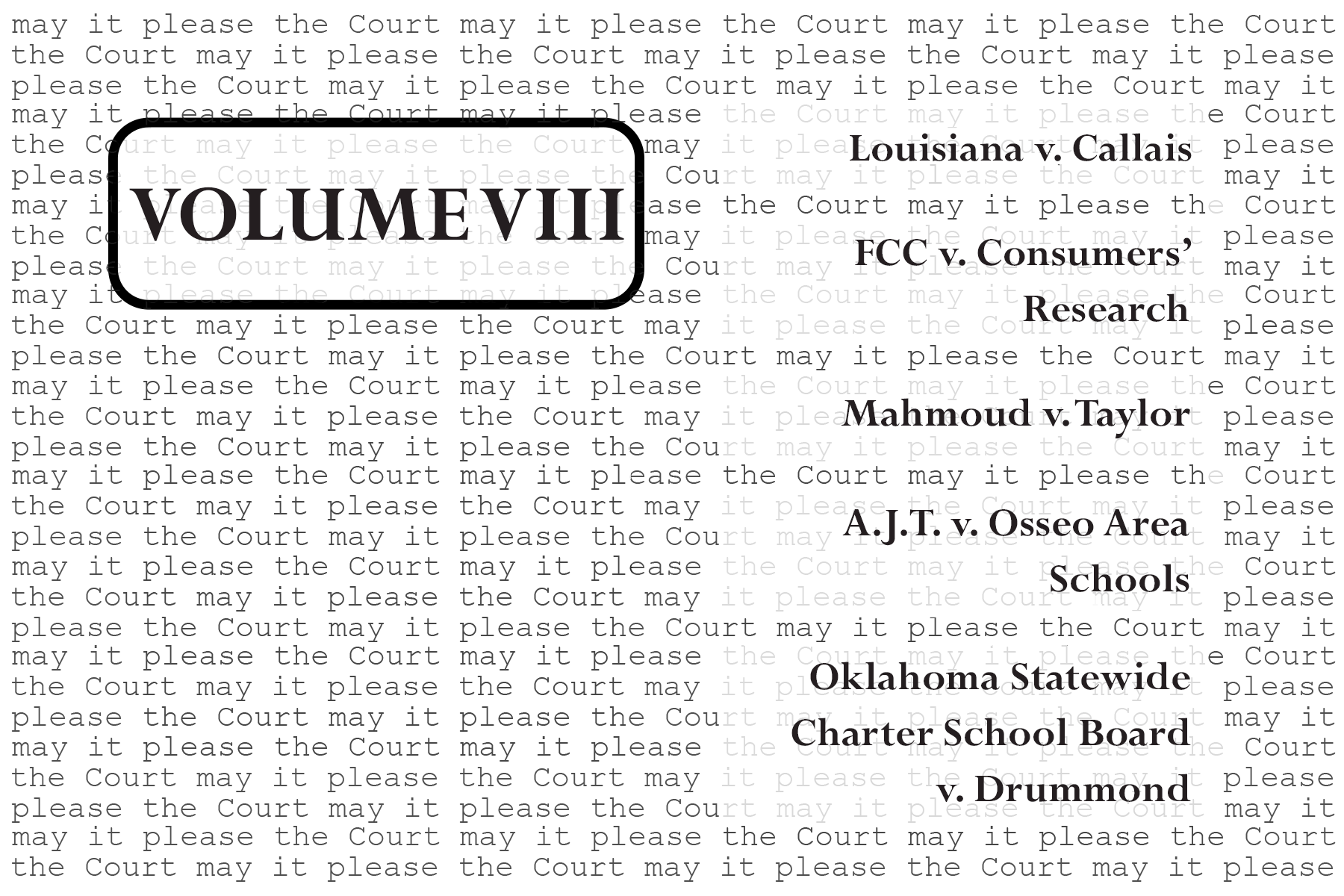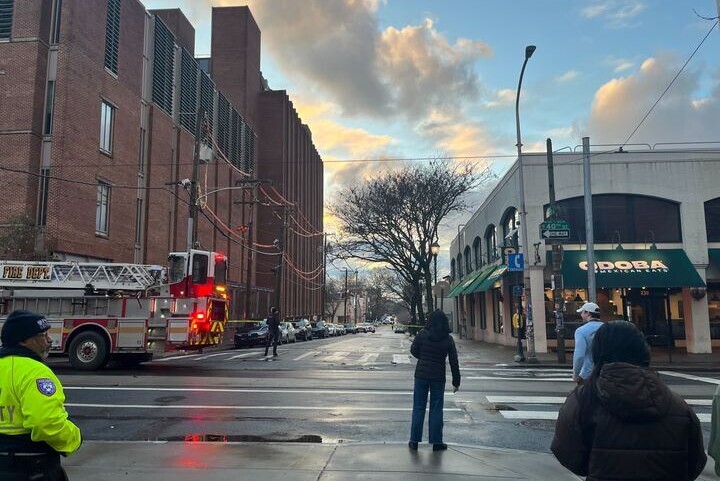The Voting Rights Act, the nondelegation doctrine, and a lot of religion
Photo Credit: Sarah Mester
By Sarah Mester
This final edition of May it please the Court will cover a selection of cases from the March and April Sittings. A total of 19 cases were heard during both sittings—a relatively packed schedule. The oral argument for A.J.T. v. Osseo Area Schools was particularly contentious, so make sure to read until the end to hear about it. In fact, the author of the SCOTUSblog article on the argument noted that it was “the most heated exchange between a justice and an advocate that I’ve heard in my decades of experience at the court.” Typically, the April Sitting is the last time the Court will hear oral argument until the start of the next term in October but this year, the Court heard argument on May 15 in Trump v. Casa, a case arising out of the Trump Administration’s move to end birthright citizenship. However, the “primary issue before the court on Thursday is whether lower-court judges can issue what are known as universal injunctions to block an order nationwide” (SCOTUSblog).
Selected Case Summaries
Louisiana v. Callais (Arg: 3.24.2025) Oyez SCOTUSblog
About: Equal Protection Clause of the 14th Amendment & Section 2 of the Voting Rights Act (1965)
Question: Does Louisiana’s creation of a second majority-black congressional district constitute unconstitutional racial gerrymandering, even when drawn in response to a federal court finding that the state’s prior single majority-black district likely violated Section 2 of the Voting Rights Act of 1965?
Explanation: Section 2 of the Voting Rights Act (1965) “prohibits voting practices or procedures that discriminate on the basis of race” (DOJ). Louisiana’s initial electoral map was ruled by a lower federal court as being an impermissible racial gerrymander that suppressed the voting power of black Louisianans. In response, Louisiana redrew the map and created a second majority-black district, but the new map was challenged under the Equal Protection Clause, which guarantees equal treatment under the law regardless of race, as prioritizing race. The Court is being asked whether Louisiana’s new map violates the Equal Protection Clause by the prioritization of race in its creation.
Federal Communications Commission v. Consumers’ Research (Arg: 3.26.2025) Oyez SCOTUSblog
About: Nondelegation Doctrine
Question: Did Congress violate the Constitution by delegating power to the Federal Communications Commission (FCC) to collect Universal Service Fund money and did the FCC violate the Constitution by letting a private, industry-controlled company make those collection decisions?
Explanation: The nondelegation doctrine is the principle that Congress cannot delegate its legislative abilities to other entities. The FCC, which regulates “communications by radio, television, wire, internet, wi-fi, satellite, and cable” (FCC), is an independent agency under the executive branch. Congress directed the FCC in 1996 to create a Universal Service Fund that subsidizes telephone service to low-income and high-cost areas. Private telecommunications companies like AT&T contribute to this fund quarterly. The FCC partnered with a private entity called the Universal Service Administrative Company (USAC) to help calculate what each company should pay. The USAC “calculates projected demand and contribution factors using FCC formulas” before submitting them to the FCC for approval and then “uses the approved figures to determine individual contribution amounts” (Oyez). The Court is being asked if the FCC’s ability to collect money on behalf of the Universal Service Fund and its partnership with USAC violates the nondelegation doctrine
Mahmoud v. Taylor (Arg: 4.22.2025) Oyez SCOTUSblog
About: Free Exercise Clause of the First Amendment
Question: Do public schools burden parents’ religious exercise when they compel elementary school children to participate in instruction on gender and sexuality against their parents’ religious convictions and without notice or opportunity to opt out?
Explanation: The Free Exercise Clause forbids Congress from “prohibiting the free exercise” of religion (U.S. Const. amend I). Maryland’s Montgomery County Public Schools (MCPS) “approved LGBTQ-inclusive books for its English Language Arts curriculum” (Oyez), but initially allowed parents to opt their children out of lessons involving the books. The policy was later rescinded. Parents of various religious backgrounds sued MCPS, arguing that the “denial of notice and opt-out options violated their religious freedom and parental rights” (Oyez). The parents do not seek for the books to be removed from the curriculum, but want to maintain control over how and when their children were introduced to topics of gender, marriage, and sexuality due to religious considerations. The Court is being asked whether the denial of notice and opt-out violated the parent’s right to freely exercise their religion under the Free Exercise Clause.
A.J.T. v. Osseo Area Schools, Independent School District No. 279 (Arg: 4.28.2025) Oyez SCOTUSblog
About: Standard of Review
Question: Does the Americans with Disabilities Act of 1990 and Rehabilitation Act of 1973 require children with disabilities to satisfy a “bad faith or gross misjudgment” standard when seeking relief for discrimination relating to their education?
Explanation: It is agreed that a child with disabilities can receive relief if they show they have suffered “intentional discrimination”. However, there are two different standards of evidence to show intentional discrimination: deliberate indifference and bad faith or gross misjudgment. It is easier to prove that a school has acted with deliberate difference than bad faith or gross misjudgement. However, most courts require that schoolchildren reach the higher standard of bad faith or gross misjudgement when suing for disability discrimination. The Court is being asked what standard children must reach to successfully sue.
Oklahoma Statewide Charter School Board v. Drummond (Arg: 4.30.2025) Oyez SCOTUSblog
About: First Amendment’s Free Exercise Clause and Establishment Clause
Question: (I) Are the educational decisions of a charter school that is privately owned and operated considered state action simply because the school has a contract with the state to provide free education to students? (II) Does the First Amendment’s Free Exercise Clause prohibit, or does the Establishment Clause require, a state to exclude religious schools from its charter-school program?
Explanation: The Oklahoma Statewide Virtual Charter School Board made a contract with St. Isidore of Seville Catholic Virtual School to serve as a virtual charter school. However, the contract “omitted standard provisions prohibiting religious affiliation while affirming St. Isidore’s religious mission” (Oyez), which Oklahoma’s Attorney General, Gentner Drummond, argued contravened the Establishment Clause’s prohibition against the government favoring one religion over another. However, the Free Exercise Clause prohibits Congress from “prohibiting the free exercise” of religion (U.S. Const. amend I). First, the Court is being asked whether St. Isidore represents government action and is therefore under the purview of the First Amendment, unlike a fully private school. Second, the Court is being asked if excluding religious schools from the charter program violates the Free Exercise Clause or if their inclusion would violate the Establishment Clause. Although the government cannot discriminate against religion, it also cannot favor any one religion. It is the tension between these two principles that is the crux of this case.
Oral Argument Excerpts
During FCC v. Consumers’ Research, Justice Sotomayor pursued a line of questioning advocate Sarah Harris was able to answer with a number of simple “yes” answers, resulting in the following exchange when Justice Kagan spoke after (29:41):
Roberts: “Justice Kagan?”
Kagan: “The easiest parts of an argument are where you just have to say yes to everything.” (Laughter)
Sotomayor: “Remember, I was a prosecutor.” (Laughter)
Kagan: “This is going to be just a little bit harder. But just a little bit.” (Laughter.)
A few minutes after the above exchange, Justice Gorsuch began his line of questioning, commenting “They’re going to get harder still. But you can handle it.” I recall reading a good Supreme Court advocate must be able to think on their feet and keep up with the flow of the argument. I believe many advocates who argue before the Court, including Sarah Harris, do just that.
In the previous edition of May it please the Court, I wrote about an exchange during which Justice Gorsuch was reminded by an advocate of a case that he wrote, but did not remember. In A.J.T. v. Osseo Area Schools, Independent School District No. 279, the same thing happened (12:38):
Martinez (Advocate for the Petitioner): “First of all, I guess what I would say is, with respect to the — the need for intent in every context, what actually helped this whole area of law click for me was reading your decision for — in the Cinnamon Hills case, which was addressing — explaining sort of the theory of reasonable accommodation statutes.”
Gorsuch: “I’m glad you remember that, because I’m not sure I do.”
Martinez: “Well, it — it was actually a very thoughtful opinion that — that really kind of teased out the differences — (Laughter.) — between disparate — intentional treatment and reasonable accommodation claims, and what — what you said in that opinion was that sometimes formal equality isn’t enough.”
I can tell from the audio that the laughter came primarily from Justice Gorsuch’s colleagues and less from the audience. Perhaps his colleagues sympathize? However, the argument for Osseo Area Schools became more tense during the speaking time of Advocate for the Respondents, Lisa Blatt. Disagreement arose over what each party had claimed in their briefings. Blatt accused the other party of lying, which prompted a strong reaction from Justice Gorsuch (50:27):
Blatt: “If I could just get this out — if I could just get this out, please. What is a lie and inaccurate is that we ever said in any context that this Court should take the same language and define it differently depending on context…That is not true. There is no statement. They adding words to our mouth. We never said you should have a double regime. What the school district has said, which is what Monahan said, is –”
Gorsuch: “You — you believe that Mr. Martinez and the Solicitor General are lying? Is that your accusation?”
Blatt: “At — at oral argument, yes, absolutely. It is not true that we –”
Gorsuch: “I think you should be more careful with your words, Ms. Blatt.”
Blatt: “Okay. Well, they should be more careful in character — mischaracterizing a position by an experienced advocate of the Supreme Court, with all due respect.”
Roberts: ““Counsel, I’m quoting from their reply brief, where they say that — with citations, what you said, that the secondary education was a “unique context” “giving rise to a unique subset” “calling for a” “different standard.””
Blatt: “Correct.”
Roberts: “That seems to me to be what the –”
Blatt: “Well, I’m sorry, no. Where does it say that quoting for a different standard? That part we never said. Are they quoting?”
Roberts: “Well, they’ve got quote marks around it. (Laughter.)”
Blatt: “Where’s the — where’s the page?”
Roberts: “It’s — it’s page 4 of their yellow brief.”
Blatt: “Oh. Well, they’r e — I mean, we never said that there should be different standards.”
[13 minutes later, 1:05:00]
Gorsuch: “Ms. Blatt –”
Blatt: “Yeah.”
Gorsuch: “– I — I confess I’m still troubled by your suggestion that your friends on the other side have lied.”
Blatt: “Okay. Let’s pull it up.”
Gorsuch: “Yeah. I think we’re going to have to here, and I’d ask you to reconsider that phrase.”
Blatt: “At oral argument –”
Gorsuch: “If I might.”
Blatt: “– it was incorrect.”
Gorsuch: “If I — if I –”
Blatt: “Sure.”
Gorsuch: “Incorrect is fine.”
Blatt: “Well, lying –”
Gorsuch: “People make mistakes.”
Blatt: “Okay.”
Gorsuch: “You can accuse people of being incorrect, but lying –”
Blatt: “That’s fine.”
Gorsuch: “Ms. Blatt, if I might finish.”
Blatt: “Sure.”
Gorsuch: “Lying is another matter.”
Justice Gorsuch questioned Blatt about the specifics of the case and again admonished Blatt for interrupting him (1:06:25) before Blatt ultimately withdrew the accusation. I encourage anyone reading to listen to the audio of the exchange to gain a full understanding of the seriousness of the dispute. I have never heard a Justice speak so sharply as Justice Gorsuch did here, although I do not think it was without good reason.
Martinez, who argued on behalf of the other side in Osseo Area Schools, started his rebuttal at the end of the oral argument by saying that he was “not going to dignify Ms. Blatt’s name-calling here with a response in kind” and he appreciated “she withdrew the charges here, although perhaps a bit under duress” (1:22:42). It is not uncommon for the relationship between each side of a case to be frosty, but it will typically manifest during an argument with statements such as “respectfully, I think my friend on the other side has [critique framed in a non-confrontational way]”. It might get less polite than that, but not by much.
Conclusion
Since this is the final edition of May it please the Court, I would like to thank anyone who read any portion of this column. Throughout the October 2024 term and as part of writing May it please the Court, I have listened to 40+ hours of oral argument, summarized over 30 cases, and written nearly 10,000 words, all in the pursuit of making understanding the Court more accessible to the layman. I have certainly learned quite a lot. I hope you have too.
Sarah Mester is a College class of 2025 alumna who studied Political Science and Classics from San Francisco, CA. She was formerly the News Editor for The Pennsylvania Post. Her email is smester@sas.upenn.edu.




